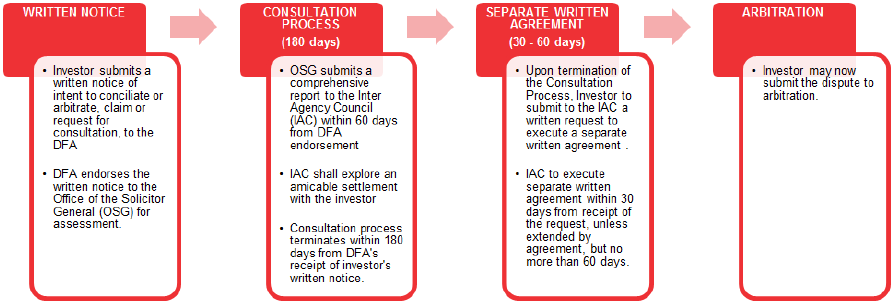21 November, 2017
The Implementing Rules and Regulations ("IRR") of Executive Order No. 78, series of 2012 ("EO 78") took effect on 27 May 2017.
The IRR implements the EO 78 mandate to all government agencies in the Executive Department to include provisions on Alternative Dispute Resolution ("ADR") in contracts involving Public-Private Partnership ("PPP") projects, Build-Operate-and-Transfer ("BOT") projects, and Joint Venture Agreements ("JVA") with the government (collectively, "Government Contracts"). EO 78 also encourages Local Government Units ("LGU") to include ADR clauses in contracts they enter into.
What it means for you
Companies negotiating or entering into Government Contracts need to: (a) consider the most appropriate ADR mechanism for their contract; and (b) properly draft the ADR clause to ensure that, in addition to complying with the IRR, any arising dispute is amicably resolved or, if not, that it is at least resolved efficiently and in a cost-effective manner. Notwithstanding the IRR provisions, poorly drafted ADR clauses could lead to delays and complications in the ADR process.
Actions to consider
The IRR requires Government Contracts to include ADR mechanisms which are designed to prevent or minimize conflicts before they arise (i.e. pre-dispute processes), or those intended to resolve or mitigate disputes after they have arisen (i.e. post-dispute processes).
Examples of pre-dispute processes covered by the IRR are the following:
Negotiation – where parties attempt to settle any dispute in good faith by themselves
Early neutral evaluation – where parties and their counsels submit the facts of a case to a third party neutral evaluator who makes a non-binding assessment of the potential dispute to convince the parties to settle
Dispute resolution board – where a panel of three or more independent technical experts are chosen by the contracting parties to assist them, on a standby basis, in resolving any dispute that may arise from the implementation of a project.
Examples of post-dispute processes under the IRR are:
Mediation – a voluntary process where a mediator, selected by the disputing parties, facilitates communication and negotiation, for them to reach a voluntary agreement regarding a dispute.
Mini-trial – a structured dispute resolution method where the merits of the case are argued before a panel comprising of senior decision makers of the parties, with or without neutral third persons, after which the parties seek a negotiated settlement.
Arbitration – a dispute resolution process voluntarily agreed upon by the parties, wherein one or more arbitrators, appointed in accordance with the agreement of the parties, resolve their dispute by rendering a binding arbitral award.
If you choose arbitration…
If the parties agree to include an arbitration clause, the IRR specifies how this should be done.
The arbitration clause should state that the subsequent submission of a dispute to arbitration (under that arbitration clause) shall be conditioned upon the execution of a separate written agreement between the contracting parties defining the terms of reference of such arbitration ("TOR"; Rule 3). This provision is not needed if the dispute is to be administered by a local arbitral institution (Annex "B", par. 3 [a]). It also appears that this requirement is not applicable if the arbitration is not "international" but domestic.
While not specified in the IRR's model arbitration clause, the IRR envisions a 6-month consultation period before the parties can agree on a TOR. The consultation process is triggered by sending a written notice of intent to conciliate or arbitrate/ claim / request for consultations to the Department of Foreign Affairs ("DFA"), which will endorse the same to the Office of the Solicitor General ("OSG"). The OSG, after making an assessment of the said written notice, shall submit a comprehensive report to an Inter Agency Council ("IAC") that is tasked to negotiate with the private party for a period of 180 days from receipt by the DFA of the written notice. The period can also be in accordance with the contract, but in no case to exceed 180 days. It is unclear from the IRR, however, whether the 6-month consultation period can be shortened if one party has indicated that it will not settle.
Upon termination of the Consultation Process, the IAC shall, upon the written request by the investor, undertake the execution of the TOR within a period of 30 days from receipt of such request. The parties can extend this period, if agreed upon, but the extension shall not extend beyond 60 days from receipt of the request to execute the TOR.
The TOR shall take into account the (a) simplification of issues; (b) possibility of obtaining admissions or stipulations of fact; and (c) such other matters as may aid in the prompt disposition of the claim or dispute.
The general procedure, therefore, from the moment a dispute arises in a government contract envisioned under the IRR, is as follows:
Please click on the image to enlarge.
The ADR institution administering the arbitration shall submit a complete copy of the arbitral award to the Department of Justice – Office of Alternative Dispute Resolution, with a copy furnished to the PPP Center and the National Economic and Development Authority, within seven (7) days from the date of signing thereof. The purpose is to create a "repository of all settlement agreements and awards for all ADR processes covered by th[e] IRR".
In case of money judgments, the same shall be submitted to the Commission on Audit before any execution may proceed.
If a dispute is construction-related, the arbitration agreement should specify the Construction Industry Arbitration Commission.
Issues to consider
The IRR provides for model clauses for commercial arbitration, construction arbitration, mediation-arbitration and dispute resolution boards and makes recommendations on the specific terms of the ADR clause, such as the place of arbitration, governing law, arbitration rules, among others. In preparing the ADR clause, the following should be carefully considered:
As the execution of the TOR is a condition precedent to arbitration, to what extent can a party refuse to sign a TOR and thereby avoid arbitration? Can a party seek to amend the arbitration clause through the TOR?
Particularly for contracts that are time-sensitive, can the parties agree to shorten the 6-month consultation period before commencing arbitration?
Will designating a locally-based arbitration institution avoid the TOR requirement and what are the pros and cons?
If the arbitration is domestic, will the TOR requirement still apply even if the administering institution is not locally-based?
If an investor does decide to introduce special provisions and/or modifications to the ADR clause, will the government side agree to deviate from the IRR's provisions, and if so, to what extent?
These are among the considerations relevant to the preparation of the arbitration clause which, if not taken into account properly, could ultimately affect the effectiveness of the ADR clause.
For further information, please contact:
Donemark Calimon, Partner, Quisumbing Torres
Donemark.Calimon@quisumbingtorres.com

.jpg)






